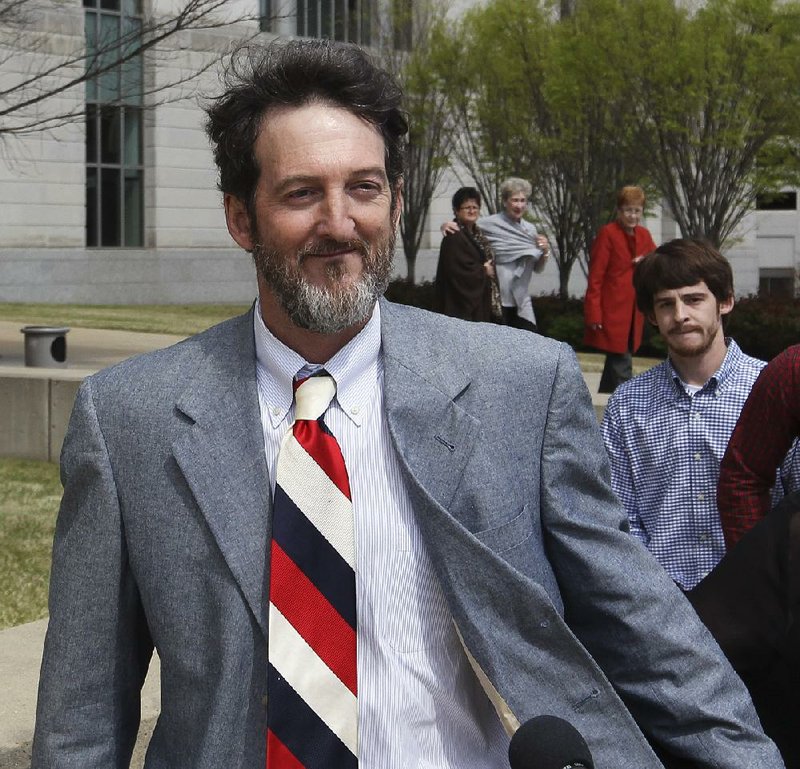CONWAY -- When Michael Maggio cut a Faulkner County jury's $5.2 million judgment to $1 million in a negligence lawsuit over a woman's nursing-home death, he said the award shocked "the conscience of the court."
Since Maggio made that ruling July 10, 2013, and later admitted under oath taking a bribe to do so, one question that has been raised is whether the since-ousted judge would have cut the award if he had not been promised thousands of dollars indirectly in campaign contributions.
Maggio has appealed his bribery conviction and the 10-year sentence that was handed down in March. Attorney John Wesley Hall has argued in the appeal that Maggio's decision to reduce the jury's $5.2 million judgment "by all accounts ... was perfectly and legally justified under the law."
As a result, Hall said, Maggio "pled guilty to something that isn't even a federal crime."
[Click here to read Jim Moody's deposition.]
[Click here to read Donald Corbin's affidavit.]
Different attorneys and judges offered conflicting answers about whether they believe that Maggio would have cut the award had it not been for the money he was offered, especially now that Maggio contends he "felt badgered" into a guilty plea in federal court, says he was "actually innocent."
On one hand, retired U.S. District Judge James Moody says the jury's award was too much. Retired Arkansas Supreme Court Justice Don Corbin says it was appropriate. Even U.S. District Judge Brian Miller, who sentenced Maggio in March, has weighed in on the dispute.
Moody and Corbin offered their opinions as witnesses in a corruption lawsuit accusing nursing-home owner Michael Morton and lobbyist Gilbert Baker of conspiring to funnel contributions to Maggio's since-halted appeals-court campaign in exchange for the reduced judgment.
Baker and Morton have denied the bribery allegations and, unlike Maggio, have not been charged with a crime.
In Maggio's decision, filed in Faulkner County Circuit Court in July 2013, he wrote "that the jury award of $5.2 million is so great that it shocks the conscience of the court. The Court also finds that the evidence, testimony, and argument by Plaintiff's counsel inflamed the jury's passion and prejudice resulting in an award that is punitive in nature, despite the Court's previous ruling that punitive damages would not be allowed in this case."
In a June 14 affidavit, Corbin wrote that, had the negligence lawsuit been appealed, he believed Maggio's decision to cut it "would have been reversed because ... $5.2 million did not shock the conscience."
"I am further of the opinion that had the case come up on appeal from the damages award that the jury verdict would have been affirmed," added Corbin, who said he had 34 years of experience as an appellate judge.
During a deposition taken in August 2015 but only recently made public, Moody said he based his opinion on "what an impartial judge would have done if that impartial judge had been trying this case and was presented with a motion for remittitur [lowering the award] and new trial."
"I think the remittitur to a million dollars was reasonable," Moody said.
Moody said he thought the jury's judgment was "clearly excessive, and ... I don't think it can be justified by the evidence of the pain [endured by the nursing-home patient, Martha Bull of Perryville].
"I think it had to include some component of either sentimentality or desire to inflate the verdict to allow for things that the jury shouldn't have considered under the instructions," Moody added.
Under questioning by the Bull family's attorney, Thomas Buchanan, Moody said, "I recognize that other people similarly qualified to me could reach a different conclusion. ... I'm not saying that I'm the ultimate arbiter here."
The question of whether an uncorrupted Maggio would have ruled the same also came up during Maggio's sentencing hearing when Miller cited Moody's opinion and decided against ordering restitution to the family of Bull, who died in Morton's Greenbrier nursing home in 2008.
Miller said he couldn't "tell whether Mr. Maggio would have remitted some portion of that [$5.2 million judgment] regardless of the arrangement he had. ... I think I would have remitted it.
"And then when I read the deposition testimony of Jim Moody, who was the expert retained to testify in the civil case -- and essentially what Judge Moody says is exactly what I was thinking as I was looking at it ... [that] the jury was moved by passion and all of that, the record would indicate it."
Assistant U.S. Attorney Julie Peters countered that Maggio had admitted to lowering the judgment by that sum in exchange for the bribe.
"We can't know what he would have done had he been a noble and honorable judge who had considered everything impartially," she added. "We can't because he was tainted by his desire to get on the [Arkansas] Court of Appeals, to get these donations. ... many judges might value it at different amounts."
Peters also said Moody had acknowledged "that different judges could come to different conclusions."
As for Moody, he said in the deposition that he wanted to make something plain.
"I'm not trying to justify what Judge Maggio did," Moody said. "If he accepted a bribe, that's not good. I acknowledge that. I'm not trying to defend Judge Maggio."
The Arkansas Supreme Court ordered Maggio removed from office in 2014 over unrelated issues dealing in part with postings he made online about women, sex, divorce, bestiality and race.
State Desk on 07/19/2016

